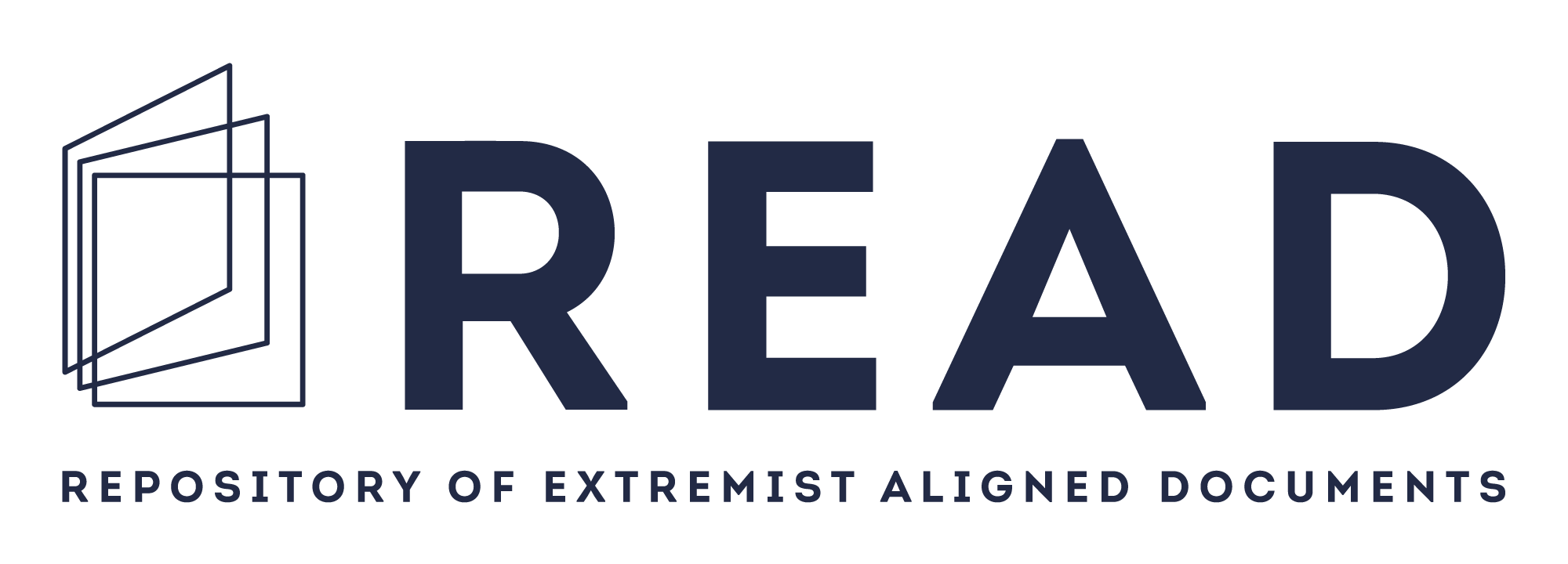Introduction
READ includes material from a variety of far-right/ideologically motivated violent extremists (IMVE). This term has been developed by the Canadian Security and Intelligence Service (CSIS), describing actors that are driven by a “range of influences, rather than by a single belief system”. It further states that:
“IMVE radicalisation is more often caused by a combination of ideas and grievances resulting in a personalised worldview that is inspired by a variety of sources including books, videos, online discussions, and conversations. The resulting worldview often centres on a willingness to incite, enable or mobilise to violence. These individuals and cells often act without a clear affiliation to a specific organised group or external guidance, but are nevertheless shaped by hateful voices and messages online that normalise and advocate violence.”
After material is sourced from forums, chan sites, Telegram channels, websites, and digital ecosystems used by extremists, each document is analysed by the READ team to determine if it meets the threshold for inclusion. Each document must be sorted into at least one of the following seven categories for it to be included in READ:
Manifestos
These are public statements of intent made by a perpetrator, group, or movement. Manifestos are overtly public. They can be instructional texts designed to guide readers through an individual’s radicalisation process or indicate a group’s ideological stance. Manifestos can also be practical documents, listing enemies, targets, and preferred means of attack. Examples include documents written and released by terrorists in anticipation of an attack.
Training or instructional material
Documents that can knowingly or purposefully be used in the preparation or commissioning of terrorist attacks. They can include material on operational security, communications, facilities, weapons, lethal substances, and explosives, among others. Training refers to instruction or teaching that is designed to impart a specific skill, whereas expert advice refers to advice or assistance derived from scientific, technical or other specialised knowledge.
Nazi material
Any documents created by the Nazi Party (Nationalsozialistische Deutsche Arbeiterpartei or NSDAP) and its paramilitary wings the SA (Sturmabteilung) and SS (Schutzstaffel). These historical documents still play an important role for present day extremists. Some are in the original German or have been translated into other languages, while others have also been rearranged and adapted for the consumption of a new audience.
Published by far-right/ideologically motivated violent extremist (IMVE) authors or publishers
Documents that have either been written by known far-right/ideologically motivated violent extremists, or by members of violent extremist groups or movements (whether proscribed or not). Also included are documents that have been created, published, printed, promoted, or disseminated by or violent extremist publishing houses.
Found in a criminal investigation
Ideologically motivated violent extremist documents that have been included as part of an arrest warrant, affidavit, criminal investigation, court proceedings or part of any legal proceedings will be included in this bucket.
Part of a reading list shared in extremist libraries/collections
These documents are part of reading lists that have been curated by violent extremist individuals, groups, or movements. They can be either mandatory or recommended readings. Documents in this bucket may also have been found in digital extremist libraries, curated libraries shared via cloud storage, image boards dedicated to violent extremist literature, or channels, groups, pages, chats dedicated to disseminating documents. Not all documents found in these libraries or collections are automatically included in READ, but they do act as an initial place for material collection.
Documents deemed valuable based on subject matter expertise
These are documents that play an important role in violent extremist ecosystems, groups, or movements, that might not fit clearly into either of the other buckets. Part of READ’s mission is to have an extremist library that is curated by subject matter experts for other experts, practitioners, and policy makers. As such the READ team will also include far-right/IMVE documents they deem valuable, following research, analysis and/or consultations.
